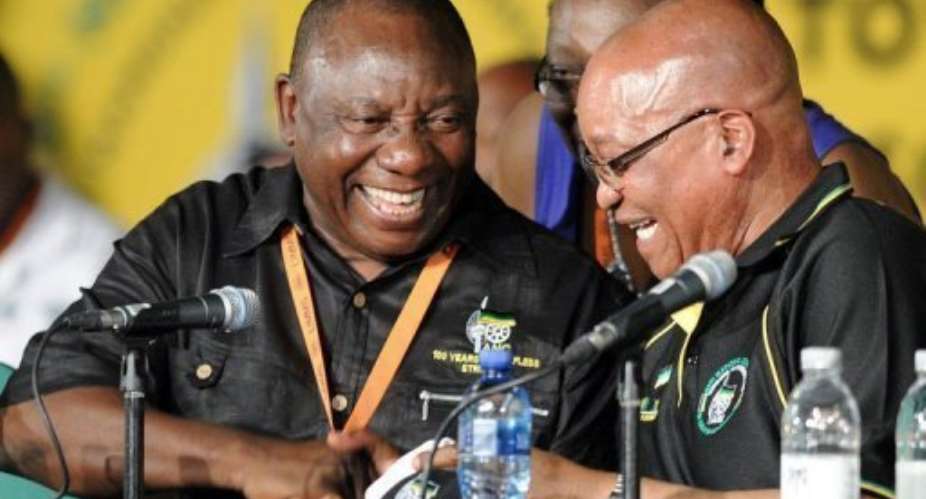BLOEMFONTEIN, South Africa (AFP) - Cyril Ramaphosa is back.
The stalwart of the anti-apartheid struggle, considered by many to be "the best president South Africa never had," was appointed deputy head of the ANC this week, making a firm favourite to become the country's next leader.
It is a political resurrection for a man once tipped to be Nelson Mandela's number two and heir apparent, but who was brazenly passed over in favour of Thabo Mbeki.
Crestfallen at being snubbed by his beloved party, Ramaphosa refused to attend Mandela's inauguration and abandoned top-level politics for more than a decade.
Instead, Ramaphosa turned his attention to business.
Today he is one of the richest men in the country, with interests in mining, fast food, beverages, property, energy, telecoms and banking.
He is worth around $364 million according to Forbes.
But the call of political power seems to have lingered, and he is now in line to take over the presidency from Jacob Zuma in 2019.
"There is an understanding that Zuma should serve his two terms and then the deputy should become president," one of the ANC's roughly 4,000 voting delegates told AFP, asking not to be named.
Ramaphosa's day in the sun could come even sooner, if rumours of a deal between the two men prove true.
But for now there are questions about what role he will play in the government. Many question whether this intensely ambitious man will be willing to play second fiddle.
He comes to the post with an exceptionally strong mandate, having won more than 76 percent of the party's vote, versus the 75 percent garnered by his boss Zuma.
As a hero of the anti-apartheid struggle with pro-business credentials, millionaire Ramaphosa, now 60, manages to be both popular with the leftist grass roots of the party and with the middle class.
ANC party insiders say the office of the deputy president will now play a role commensurate with Ramaphosa's stature and backing.
The "position of Deputy President is that of leader of government business therefore de-facto prime minister," ANC spokesman Jackson Mthembu said Thursday.
That could mark a significant change from the incumbent Kgalema Motlanthe, who is most often seen in public making history-laden speeches.
He could provide an injection of energy to a government roundly condemned for inaction, most notably over its failure to deal with the recent labour crisis that saw police kill 34 striking miners in one day.
"Several of the (ANC) delegates in conversation repeated the argument -- Zuma is 70, basically tired and personally ready for retirement," said Susan Booysen a political analyst at the University of the Witwatersrand.
"He is just not fired up to tackle South Africa's vexing policy and governance issues with a new gusto, they argued."
Under this scenario round one was getting Zuma re-elected at the Bloemfontein conference.
"Round Two -- after having demonstrated loyalty and respect towards Zuma -- would be to ensure a smooth exit and a credible successor."
What is clear is that the ANC will try to harness Ramaphosa's business cred to improve its own.
Amid slow growth and high unemployment, a series of credit ratings downgrades have increased allegations that the ANC cannot manage the economy and is anti-business.
Along with commitments not to nationalise the mining sector, Ramaphosa's appointment might just be enough to head off more credit downgrades, which have been threatened.
"Ramaphosa brings talents and skills acquired in a working life that includes legal practice, leadership of a union, negotiating our democratic constitution and being a business leader," former arts minister Pallo Jordan said.
"Having seized the opportunities that came with democracy, we expect Ramaphosa to lead the charge in defining a more positive role for black capitalists."
As a former secretary general of the National Council of Mineworkers and as a shareholder of Lonmin, where the 34 miners were killed, Ramaphosa may be in a unique position to help quell further unrest.
Yet his strength is a double-edged sword for Zuma.
Having such a powerful number two undoubtedly bolsters Zuma's battered standing ahead of the elections in 2014, but the risk of a power struggle is real.
"I cannot believe anyone with Ramaphosa's talents, energy and ambition is prepared to be a wallflower in Zuma's suite of presidential offices," said Allister Sparks, a columnist with the Business Day newspaper.





 DR Congo thwarts Kinshasa 'coup attempt': army
DR Congo thwarts Kinshasa 'coup attempt': army
 Media has made good progress in Ghana — Frema Opare
Media has made good progress in Ghana — Frema Opare
 E/R: We will demonstrate against our parliamentary candidate for disappearing af...
E/R: We will demonstrate against our parliamentary candidate for disappearing af...
 Kotokuom elders issue ultimatum to Kwaku Boah to stop defaming Atwima Agogohene ...
Kotokuom elders issue ultimatum to Kwaku Boah to stop defaming Atwima Agogohene ...
 W/R: Tragic premix explosion injures 16 in Ngyirasia
W/R: Tragic premix explosion injures 16 in Ngyirasia
 Election 2024: NDC pledges to scrap betting tax, targets 80% youth support
Election 2024: NDC pledges to scrap betting tax, targets 80% youth support
 Mahama was a one-term president because he was incompetent and brought untold ha...
Mahama was a one-term president because he was incompetent and brought untold ha...
 Blame IMF programme for Cedi's decline —Prof Bokpin
Blame IMF programme for Cedi's decline —Prof Bokpin
 Court denies Kasoa soldier killer bail
Court denies Kasoa soldier killer bail
 Ahmed Suale's killers will be brought to justice no matter how long it takes - A...
Ahmed Suale's killers will be brought to justice no matter how long it takes - A...
